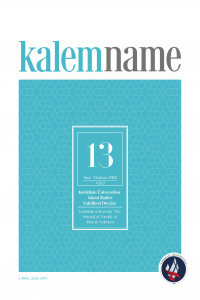PLATON ve ARİSTOTELES’İN PERSPEKTİFİNDEN İLK ÇAĞ’DA ADALETİN FARKLI GÖRÜNÜMLERİ
Erdem, Adalet, Eudomonia, Platon, Aristoteles
DIFFERENT VIEWS of JUSTICE in THE EARLY AGES FROM THE PERSPECTIVE of PLATO and ARISTOTLE
Virtue, Justice, Eudaimonia, Plato, Aristotle,
___
- Aristoteles. Nikomakhos’a Etik. çev. Saffet Babür. Ankara: Bilgesu Yayıncılık. 2007.
- Aristoteles. Politika. çev. Mete Tunçay. İstanbul: Remzi Kitabevi. 2014.
- Arslan Topakkaya. “Adalet Kavramı Bağlamında Platon ve Aristoteles Karşılaştırması”. FLSF Felsefe ve Sosyal Bilimler Dergisi. 6. (Eylül 2008). 27-46.
- Arslan Topakkaya. “Aristoteles’te Adalet Kavramı”. Uluslararası Sosyal Araştırmalar Dergisi. 2/6 (2009). 628-633.
- Aysel Demir. John B. Rawls- Eleştirel Bir Yaklaşım. Ankara: Siyasal Kitabevi. 2018.
- Christopher Shields. Aristotle. London: Routledge Press.2007.
- D. W. Ross. Aristoteles. çev. Prof. Dr. Ahmet Arslan. İzmir: Ege Üniversitesi Yayınları. 1993.
- Delba Winthrop. “Aristotle and Theories of Justice”. The American Political Science Rewiev. 72/4 (December 1978). 1201-1216.
- F. H. Sparshott. “Five Virtues in Plato and Aristotle”. The Monist. 54/1 (January 1970). 40-65.
- H.W.B. Joseph. “Aristotle’s Defination of Moral Virtue and Plato’s Account of Justice in the Soul”. Philosophy. 9/34 (April 1934). 168-181.
- Jiyuan Yu. “Aristotle on "Eudaimonia": after Plato's "Republic"”. History of Philosophy Quarterly. 18/2 (April 2001). 115-138.
- Julia Annas. Plato A Very Short Introduction. New York: Oxford University Press. 2003.
- Limin Bao and Lin Zhang. “Justice is Happiness?- An Analysis of Plato’s Strategies in Response to Challenges from the Sophsists”. Frontiers of Philosophy in China, 6/2 (June 2011). 258-272.
- Platon. Devlet. çev. Sebahattin Eyüboğlu- M. Ali Cimcoz. İstanbul: Türkiye İş Bankası Kültür Yayınları. 2007. Stephen Buckle. “Aristotle's "Republic" or, Why Aristotle's Ethics Is Not Virtue Ethics”. Philosophy. 77/302 (Oct. 2002). 565-595.
- Xianzhong Huang. “Justice as a Virtue: An Analysis of Aristotle’s Virtue of justice”. Frontiers of Philosophy in China. 2/2 (April 2007). 265-279.
- Yayın Aralığı: Yılda 2 Sayı
- Başlangıç: 2016
- Yayıncı: Kırıkkale Üniversitesi
MODERN ve SOYUT SANATA İLHAM VEREN BİR RESSAM: VİNCENT van GOGH
ELÂZIĞ DÂRU’L-HAZEN TEKKESİ’NİN TÜRK DİN MÛSİKÎSİ UYGULAMALARI
10-14 YAŞ GRUBUNDAKİ ÖĞRENCİLERDE ÖZ SAYGI ile TANRI ALGISI ARASINDAKİ İLİŞKİNİN İNCELENMESİ
Şükriye DEMİR, Fatıma Zeynep BELEN
OTİZME YÖNELİK TÜRKÇE TWİTTER İLETİLERİNİN YAPAY ZEKÂ TEMELLİ DUYGU ÇÖZÜMLEMESİ
FAHREDDİN er-RÂZÎ’NİN TEFSİR-İ KEBİR’İNDE BAZI CENNET TASVİRLERİNE GETİRDİĞİ YORUMLAR
AKSARAY İLİ ORTAKÖY İLÇESİ KÜMBET KÖYÜ ABDALLARININ HALK İNANIŞLARI ÜZERİNE BİR ARAŞTIRMA
Cebrail ÖZTAPAN, Muhammed GÜNGÖR
MUSTAFA SÂDIK er-RÂFİÎ’NİN İ´CÂZU’L-KUR’ÂN ADLI ESERİNDE İKTİBAS SANATI
PLATON ve ARİSTOTELES’İN PERSPEKTİFİNDEN İLK ÇAĞ’DA ADALETİN FARKLI GÖRÜNÜMLERİ
ÇEVİRİDE BULUNMASI GEREKEN HUSUSLAR ve ÖRNEK ÇEVİRİLER ÜZERİNDE İNCELEME
